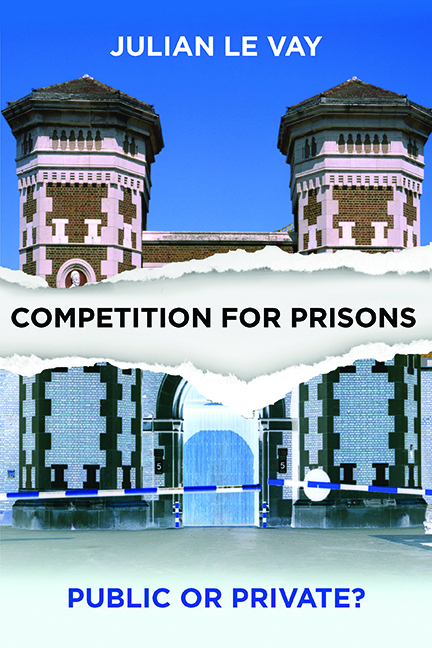Book contents
- Frontmatter
- Contents
- List of tables and figures
- List of acronyms
- Preface
- 1 Origins
- 2 Evolution
- 3 Related markets: immigration – two sectors, no competition
- 4 Youth custody
- 5 Related markets: electronic monitoring – fall of the giants
- 6 The quasi-market: characteristics and operation
- 7 Comparing public and contracted prisons
- 8 Comparing quality of service
- 9 Costing the uncostable? Civil Service pensions
- 10 Costing the uncostable? PFI
- 11 Comparing cost
- 12 Impact of competition on the public sector
- 13 Objections of principle
- 14 Related markets: probation – how not to do it
- 15 Has competition worked?
- 16 Has competition a future?
- Appendix Prescription of operating procedures in prison contracts
- Bibliography
- Index
- Frontmatter
- Contents
- List of tables and figures
- List of acronyms
- Preface
- 1 Origins
- 2 Evolution
- 3 Related markets: immigration – two sectors, no competition
- 4 Youth custody
- 5 Related markets: electronic monitoring – fall of the giants
- 6 The quasi-market: characteristics and operation
- 7 Comparing public and contracted prisons
- 8 Comparing quality of service
- 9 Costing the uncostable? Civil Service pensions
- 10 Costing the uncostable? PFI
- 11 Comparing cost
- 12 Impact of competition on the public sector
- 13 Objections of principle
- 14 Related markets: probation – how not to do it
- 15 Has competition worked?
- 16 Has competition a future?
- Appendix Prescription of operating procedures in prison contracts
- Bibliography
- Index
Summary
Prologue
Ironically, given that privately run prisons are identified with ‘Thatcherism’, the outsourcing of the State's use of custody began much earlier – and under a Labour administration. In 1970, the Home Office contracted with Securicor for custody of immigration detainees at Heathrow and elsewhere. But after initial protests by pressure groups and Labour MPs, interest died quickly away.
The state of the prisons
There can be few public service monopolies harder to justify than HM Prison Service (HMPS) in the 1980s.
Prisoner numbers increased dramatically in the second half of the decade (Figure 1.1). The rise was primarily in remand prisoners, who already suffered by far the worst conditions. The Thatcher administration was doing something about it – building 22 new prisons plus 8,000 more places within existing prisons. But construction was painfully slow – in some cases taking seven years from issue of the design brief to opening – and cost and time overruns were the rule (see Chapter 11).
As a result, this huge building programme failed for much of the decade even to keep pace with rising numbers, and prisons remained horrifically overcrowded. In 1987, some 19,000 prisoners were held two or three to a cell designed to hold one, with those prisoners enduring the squalor of others defecating into buckets inches from their bunk, the bucket remaining there for many hours. And not just at night: in many prisons, prisoners were locked in their cells most of the day. Regimes were far more restricted than two decades earlier (King and McDermott, 1989). Hundreds of prisoners had to be held in police cells, at vast cost (Figure 1.2), others in a hastily converted ex-RAF site.
The reality of prison life in the 1980s is vividly recalled by a governor at Strangeways prison, pre-riot:
‘the smell of excrement and urine at slop out, the abysmal food that we served, the relationship between staff and prisoners where every second word was “fuck”, prisoners weren't treated with respect, they weren't treated with decency, visitors were treated as if they were prisoners as well, the place was run for the benefit of staff earning massive amounts of overtime at fantastic cost, where racism and brutality was rife.’ (Bastow, 2013)
Small wonder that not even the Home Office believed prisons could turn offenders away from crime.
- Type
- Chapter
- Information
- Competition for PrisonsPublic or Private?, pp. 1 - 12Publisher: Bristol University PressPrint publication year: 2015



